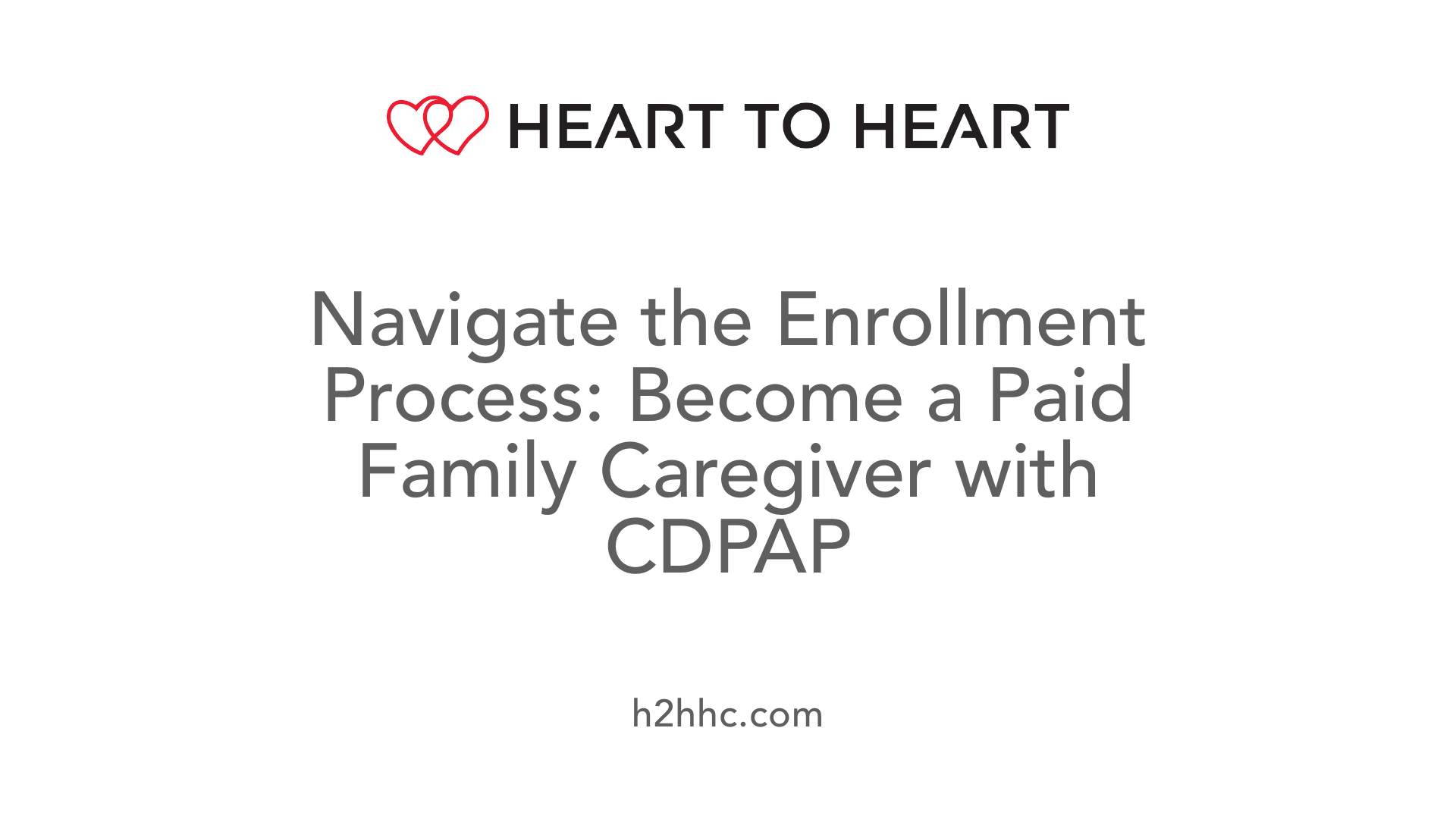How Medicaid's CDPAP Transforms Family Caregiving
May 13, 2025

The Consumer Directed Personal Assistance Program (CDPAP) is revolutionizing the way families approach caregiving in New York. By offering a flexible, personalized system where loved ones can become paid caregivers, the program fosters stronger family bonds, enhances emotional well-being, and supports aging with dignity. This article explores the transformative role of CDPAP in strengthening family relationships and creating a more inclusive, supportive home care environment.

Becoming a paid caregiver under the Consumer Directed Personal Assistance Program (CDPAP) involves meeting specific eligibility standards. Family members interested in becoming caregivers must be at least 18 years old and legally able to work in the United States. In most cases, they cannot be the spouse of the person receiving care or, if the recipient is a minor, the parent cannot serve as the caregiver. These criteria ensure that caregivers are capable of providing the required support and comply with employment regulations.
The process begins with the consumer or their authorized representative recruiting a caregiver. Once identified, the caregiver must complete registration with the Statewide Fiscal Intermediary, Public Partnerships LLC (PPL), which manages payroll, taxes, and compliance. The enrollment involves submitting necessary documentation and completing training and background checks.
To ensure a smooth onboarding, caregivers must adhere to specific deadlines, notably registering with PPL by May 15, 2025, for consumers and June 6, 2025, for caregivers. Applicants can seek assistance through phone calls, online platforms, or in-person sessions to help with the application process. Once enrolled, caregivers are responsible for maintaining compliance with program rules, completing employment documentation, and providing consistent, quality care.
This structured enrollment process supports the program's goal of ensuring qualified, trustworthy caregivers can deliver personalized assistance to those in need, especially family members who want to provide care for their loved ones.

The Consumer Directed Personal Assistance Program (CDPAP) is designed to empower individuals requiring care by giving them the freedom to choose their own caregivers. One of its most impactful aspects is the promotion of family involvement in the caregiving process. Unlike traditional home care services, CDPAP allows family members such as children, spouses, or siblings to serve as paid caregivers. This arrangement fosters deeper emotional connections, as family members are directly involved in providing daily support, personal assistance, and emotional care.
Having loved ones as caregivers brings many benefits. It enhances trust and communication, making it easier for the recipient to express their needs and preferences. Personalized routines and cultural considerations are easier to incorporate, leading to care that truly respects the individual’s lifestyle. Furthermore, family caregivers receive financial compensation, acknowledging their dedication and effort, which can alleviate some of their emotional and physical burdens.
This shared involvement nurtures stronger family bonds, creating a supportive environment where mutual respect and understanding thrive. It allows families to maintain closer relationships, even while managing caregiving responsibilities. Overall, CDPAP’s flexibility in involving family members as caregivers not only improves the quality of care but also fosters a sense of community, security, and emotional well-being for all involved.

The Consumer Directed Personal Assistance Program (CDPAP) significantly promotes family participation in caregiving by allowing relatives to serve as paid caregivers. This means that family members, including spouses, children, and siblings, can be formally recognized and compensated for providing personal assistance to their loved ones. Such a setup not only strengthens family bonds but also makes caregiving more personalized and trusted.
One of the main advantages of CDPAP is that it gives families the flexibility to select caregivers they know and trust, which can improve the quality of care and emotional well-being for the recipient. Since family members are directly hired and managed by the individual needing care, the caregiving process becomes more tailored to the recipient’s preferences.
In addition to allowing family caregiving, CDPAP is part of a broader support system. It often involves coordinating with agencies that provide benefits counseling, respite care, education, and training. These supports help family caregivers manage their responsibilities more effectively, reduce stress, and prevent burnout.
The program also provides financial relief by covering the wages of family members acting as caregivers. This recognition and support empower families to participate actively without financial strain, making caregiving more sustainable.
By establishing a formal framework for family involvement, CDPAP encourages greater participation and support within the family unit. It fosters a caregiving environment where loved ones are not only caregivers but also integral members of the care team, which can lead to better health outcomes and stronger familial relationships.
The CDPAP plays a significant role in fostering increased family involvement and support in caregiving by allowing family members to serve as paid caregivers. This formal recognition provides financial compensation, which can help alleviate some of the economic burdens associated with caregiving.
Furthermore, the program empowers families by giving them the authority to hire and manage their caregivers, ensuring that care remains personalized and consistent. This setup encourages active participation from family members, who are often the most trusted and familiar caregivers for their loved ones.
Supporting family caregivers through CDPAP is also complemented by additional services such as training, respite, and benefits counseling. These services are typically provided through regional agencies and help families better manage caregiving responsibilities, enhance their caregiving skills, and maintain their own well-being.
Overall, by enabling family members to be formally involved and supported, CDPAP helps strengthen family bonds, promotes continuity of care, and improves the quality of life for those receiving care and their loved ones.
The Consumer Directed Personal Assistance Program (CDPAP) transforms traditional home care by actively involving families in the management and delivery of care services. It empowers recipients to choose their caregivers, including family members and friends, turning them into paid caregivers if they meet the necessary criteria. This flexibility ensures that family members can take on roles such as providing everyday personal care, medication reminders, and assistance with daily routines.
Within the CDPAP framework, responsibilities are often shared among multiple caregivers. For example, family members can split duties like bathing, dressing, or managing health conditions based on their capabilities and the recipient’s needs. This collective approach promotes a more personalized care plan, tailored to the preferences and circumstances of the individual receiving help.
Additionally, recipients or their designated representatives handle key administrative duties, including recruiting, training, scheduling, and supervising caregivers. This level of involvement encourages a collaborative environment, where families are directly engaged in managing care, making decisions, and ensuring quality. Family participation is further supported by the program’s allowance for multiple caregivers, fostering shared accountability and stronger family bonds.
Overall, CDPAP enhances family involvement through formalized responsibilities and flexible caregiving arrangements. It not only enables families to participate actively in day-to-day care but also helps create a harmonious and trusted care environment, which is essential for the emotional and physical well-being of both the care recipient and their loved ones.
The Consumer Directed Personal Assistance Program (CDPAP) plays a significant role in strengthening family relationships by empowering family members and trusted friends to become paid caregivers. This setup allows families to be actively involved in the daily care of their loved ones, fostering closer bonds and shared responsibility.
Through CDPAP, families can select caregivers based on trust and familiarity, ensuring that care aligns with personal preferences and needs. This personalized approach promotes continuity and stability in caregiving, which benefits both the recipient and their family.
Financial support is also a crucial aspect. Caregivers, often family members, receive compensation for their services, recognizing their efforts and alleviating some of the emotional and financial burdens of caregiving. This acknowledgment encourages ongoing family participation.
Moreover, the program enables families to be directly involved in care management, including supervision and decision-making. Such involvement enhances communication, understanding, and emotional bonds, making caregiving a shared family effort.
Overall, CDPAP actively promotes family involvement by facilitating employment, support, and shared responsibility, which leads to stronger family cohesion and improved quality of life for both caregivers and care recipients.
The Consumer Directed Personal Assistance Program (CDPAP) in New York offers a unique approach to home care by empowering individuals to select their caregivers, including family members and friends. This choice fosters a deeper emotional connection between the care recipient and their caregiver, as it promotes personal relationships built on trust and familiarity.
By enabling family members to become paid caregivers, CDPAP encourages active participation in caregiving roles. Family caregivers can provide personalized daily support, which helps strengthen family bonds. This involvement not only improves the quality of care but also enhances the emotional well-being of everyone involved.
Families are given control over care routines, making the process more aligned with their loved one's preferences. Such tailored care fosters a sense of autonomy and dignity, which are vital for emotional health.
Moreover, when caregivers are trusted family members or friends, the individual receiving care often feels more comfortable and secure. This environment benefits mental health, especially for seniors and individuals managing depression, as they are cared for by familiar, trusted individuals.
The program also nurtures collaboration between families and healthcare providers, encouraging open communication and shared decision-making. These factors contribute to stronger, healthier relationships, fostering greater emotional resilience within families.
In summary, CDPAP’s approach to personalized, family-centered care not only meets physical needs but also nurtures emotional bonds, creating a supportive environment where trust, familiarity, and compassion thrive.
 The CDPAP (Consumer Directed Personal Assistance Program) offers a flexible and personalized approach to home care, significantly emphasizing family involvement. One of its main features is that it allows Medicaid beneficiaries to select their own caregivers, including trusted family members and friends. This means that recipients can choose caregivers who are familiar with their personal preferences, cultural backgrounds, and specific needs, creating a more comfortable and tailored care experience.
The CDPAP (Consumer Directed Personal Assistance Program) offers a flexible and personalized approach to home care, significantly emphasizing family involvement. One of its main features is that it allows Medicaid beneficiaries to select their own caregivers, including trusted family members and friends. This means that recipients can choose caregivers who are familiar with their personal preferences, cultural backgrounds, and specific needs, creating a more comfortable and tailored care experience.
By giving recipients the authority to hire, train, and manage their caregivers, CDPAP fosters a sense of control and ensures that care plans truly reflect individual circumstances. Family members who meet the eligibility requirements—such as passing background checks and completing necessary training—can become paid caregivers. This arrangement supports continuity of care, strengthens family bonds, and helps maintain familiar routines.
Moreover, the program encourages culturally sensitive and personalized care, as family caregivers often have better insight into the recipient's preferences and social background. It also promotes the emotional well-being of recipients by allowing them to receive support from trusted loved ones.
Overall, CDPAP’s structure not only enhances the quality of care but also empowers families to participate actively in caregiving, fostering closer relationships and ensuring that the care provided aligns with the individual’s lifestyle and preferences.
For more details, search terms like "Personalized family-inclusive caregiving in CDPAP" can provide additional insights into how the program supports tailored and family-centered home care.
The Consumer Directed Personal Assistance Program (CDPAP) has a significant positive impact on family relationships by empowering loved ones to take an active role in caregiving. When family members, such as adult children, spouses, or siblings, are allowed to serve as paid caregivers, it fosters stronger emotional bonds and a sense of shared responsibility.
By enabling families to choose their caregivers, the program promotes trust and enhances intimacy, leading to more personalized and meaningful care. Care recipients often feel more comfortable and secure when cared for by familiar family members, which can help reduce feelings of loneliness, anxiety, and depression.
Furthermore, involving family members in caregiving creates a supportive environment that improves communication and coordination. This collaboration not only benefits the individual receiving care but also strengthens the overall family dynamic.
The act of providing or receiving care within the family can enhance emotional security and mutual understanding, contributing to healthier relationships. Recognizing and compensating family caregivers also validates their efforts, making them feel valued and appreciated.
Overall, CDPAP fosters deeper emotional connections by promoting collaborative caregiving, leading to a more emotionally resilient family unit and improved well-being for both caregivers and recipients.

The Consumer Directed Personal Assistance Program (CDPAP) offers significant benefits that help family caregivers grow and thrive in their roles. Emotionally, the program fosters a deep sense of fulfillment and purpose. Caregivers often experience increased emotional well-being as they engage meaningfully in their loved ones' care, knowing they are providing personalized and compassionate support.
Financial benefits are also noteworthy. Caregivers can receive compensation for their efforts, which alleviates economic stress. Being paid for caregiving not only recognizes their contributions but also helps cover the costs associated with providing care, such as transportation or additional supplies.
Furthermore, CDPAP empowers caregivers to take control of their roles. They can select, train, and manage their own caregiving activities, which enhances their personal growth and skills. Access to training resources helps improve caregiving techniques, safety, and communication. This sense of ownership and skill development can boost confidence and independence.
Respite care and support services, often promoted alongside CDPAP, play an essential role in preventing burnout. They offer caregivers a chance to rest, recharge, and maintain their well-being.
Overall, CDPAP underlines the value of family caregivers, contributing to their emotional satisfaction, financial stability, and personal development. By recognizing and supporting their efforts, the program ensures caregivers are equipped and motivated to provide high-quality, compassionate care.
| Benefit Area | Specific Impact | Additional Notes |
|---|---|---|
| Emotional | Increased fulfillment, reduced stress | Engaging in meaningful care, valuing the caregiver role |
| Financial | Compensation for services | Eases economic burdens, recognizes efforts |
| Personal Growth | Skill and confidence building | Access to training, management of care roles |
| Well-being | Preventing burnout | Respite services, supportive resources |
This comprehensive approach helps caregivers not only support their loved ones but also grow personally, ensuring a healthier and more sustainable caregiving experience.
The CDPAP program exemplifies a transformative approach to home care by empowering families to play a central role in caregiving, fostering emotional connections, and supporting personalized care. Through its flexible, family-centered model, the program not only improves the quality of life for care recipients but also strengthens the bonds within families. As Medicaid continues to support and expand programs like CDPAP, the future of home care promises increased involvement, emotional fulfillment, and a more compassionate, community-based approach to caring for aging and disabled loved ones.
09:00 AM - 06:00 PM
Monday - Friday
2488 Grand Concourse Suite 409, Bronx, NY, 10458
T: 718-305-5858
F: 718-305-6258
1 Smith Street, 3rd Floor, Brooklyn, New York, 11201
T: 718-305-5959
F: 718-305-6259
2361 Nostrand Ave Suite 401 Brooklyn, NY 11210.
T: 718-305-6060
F: 718-305-6260
576 Central Ave # 301, East Orange, NJ 07018
433 Woodbury Glassboro Road Sewell, NJ 08080
1172 Fischer Blvd, Toms River, NJ 08753
T: (973) 678-5500
njinfo@h2hhc.com








